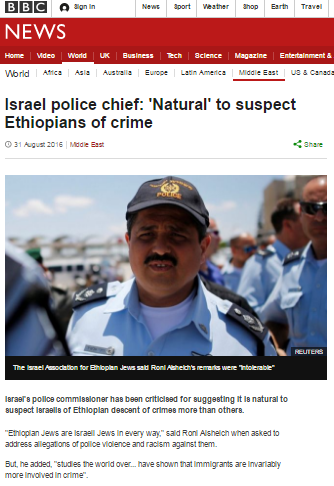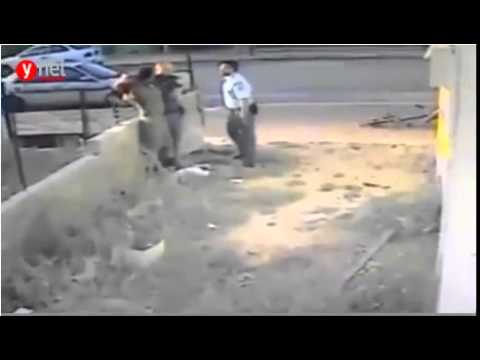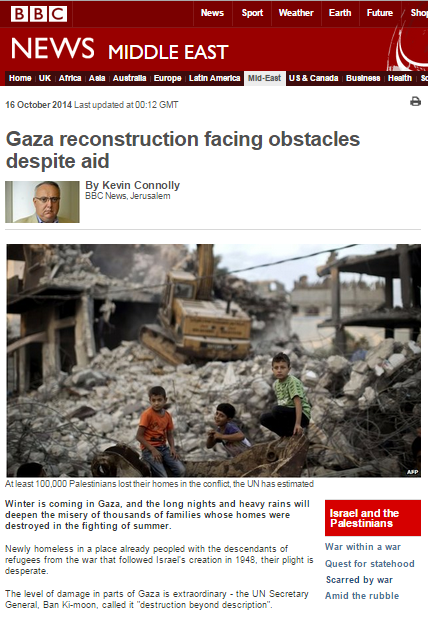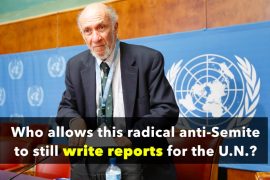On August 31st the BBC News website chose to publish on its Middle East page an article about a wholly domestic Israeli story. Misleadingly headlined “Israel police chief: ‘Natural’ to suspect Ethiopians of crime“, the report opens:
“Israel’s police commissioner has been criticised for suggesting it is natural to suspect Israelis of Ethiopian descent of crimes more than others.”
Readers have to proceed to paragraph seven of the article to get past that sensationalist framing and find out what was really said by the police commissioner trying to combat the phenomenon of over-policing which is of course evident in many democratic countries, including the UK.
“At a meeting of the Israel Bar Association in Tel Aviv on Tuesday, Mr Alsheich was asked why Ethiopian-Israelis appeared to be singled out by his force.
“Studies the world over, without exception, have shown that immigrants are invariably more involved in crime than others, and this should not come as a surprise,” he responded.
Research had also shown that young people in general were more involved in crime and that “when the two come together, there’s a situation in which a given community is more involved than others in crime, statistically speaking”, he added.
The commissioner said this had been the case “in all the waves of immigration” to Israel, and “also with regard to [Israeli] Arabs or [Palestinians in] East Jerusalem”.
“When a police officer comes across a suspicious person, his brain suspects him more than if he were someone else. It’s natural,” he continued.
“We know this. We have started to deal with this.””
In addition to providing extensive amplification of reactions to the police commissioner’s words, the article tells readers that:
“Last year, thousands took to the streets to protest against alleged police abuses after a video emerged showing two officers beating an Ethiopian-Israeli soldier.”
Underneath that paragraph (with its redundant link) appeared another link titled “The plight of Ethiopian Jews in Israel” which leads to a BBC article with the same title published in May 2015. There audiences are told that:
“The unprovoked beating up by policemen of Demas Fekadeh, an Ethiopian Israeli soldier in uniform, could well serve as a much necessary wake-up call for Israeli society to change, quickly and radically, its treatment of the 130,000 Israeli citizens and their descendants who immigrated from Ethiopia.” [emphasis added]
That article has not been updated to clarify that the incident was the subject of a subsequent investigation which indicated that the BBC’s use of the word “unprovoked” is inaccurate.
“Attorney General Yehuda Weinstein said Sunday he will close the criminal investigations against both the police officer who manhandled Ethiopian-Israeli soldier Demas Fekadeh and against Fekadeh himself. The incident in early May was caught on CCTV and sparked angry protests by thousands of Israeli Jews of Ethiopian descent in Tel Aviv and elsewhere.
Weinstein’s decision comes on the recommendation of the state prosecutor and Justice Ministry investigators, who determined that Fekadeh initiated the clash with the policeman, and that the policeman’s handling of the confrontation was “impeccable.”[…]
Justice Ministry investigators say Fekadeh attacked the policeman first and disregarded the officer’s instructions. “From the investigative material, including the film that documented the incident, which was studied extensively, including in slow motion, it emerged that after the police officer asked the soldier repeatedly to leave the scene because of a suspicious object nearby, and the soldier did not do so, and pushed the policeman, the policeman used tangible force to distance the soldier from the scene. In response, the soldier struck the policeman with his fist and in response to that, the police officer struck the soldier with his fist. In the end, the two police officers overpowered and restrained the soldier.””
In the same 2015 BBC article readers are told that:
“One of the early incidents that exposed this approach was the revelation in the 1990s that the Israeli national blood bank had routinely destroyed blood donated by Ethiopian Israelis for fear of HIV.
It sent a message of exclusion from the rest of the Israeli society.”
Three years ago BBC audiences saw Yolande Knell promote that same inaccurate claim and as was noted here at the time:
“…had Knell bothered to read the 1996 report by former Israeli president Yitzhak Navon into that incident before putting finger to keyboard, she would know that the disposal of those blood donations was the result of a failure by the blood services (which are run by Magen David Adom – not “the Israeli authorities” as Knell states) to update an earlier directive from 1984 (at the time of Operation Moses) which related not to HIV, but to Hepatitis B, Tuberculosis and Malaria. The Navon report stated:
“Contrary to the public impression, there is no connection between the decision made in 1984 and AIDS.”
“At the time the health services were worried by findings connected to the prevalence of diseases such as Malaria, Tuberculosis and Hepatitis among the Ethiopian immigrants from ‘Operation Moses’.”
To remind readers, the risk of the transmission of HIV through donated blood was first recognized in 1983 and standardised testing of blood donations for HIV and the then newly identified Hepatitis C virus began around 1992. Whilst the disposal of those blood donations from members of the Ethiopian community in 1996 was undoubtedly insensitive, it was not founded in racism but based on the very real problem which existed worldwide at the time concerning the possibility of the transmission of infectious diseases via blood transfusions. To this day – regardless of skin colour – one cannot donate blood in Israel if one has lived in a country in which Malaria is endemic until three years have passed by since leaving that country.”
Once again we see that in its haste to promote a story which portrays Israel as a country rotten with racism, the BBC has sidelined editorial standards of accuracy.
Related Articles:
BBC’s Knell regurgitates Ha’aretz slurs
Three year old allegations from BBC’s Yolande Knell shown to be untrue
BBC reporting of Tel Aviv demonstration neglects important background
BBC Radio 4 promotes Nazi analogy in a discussion on antisemitism





